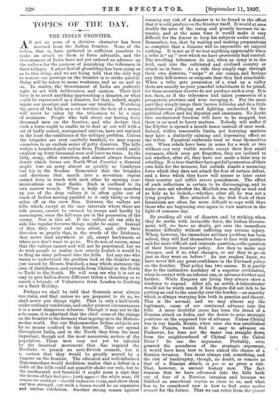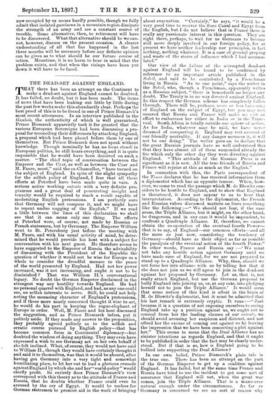TOPICS OF THE DAY.
•
THE INDIAN FRONTIER.
A'yet no news of a decisive character has been received from the Indian frontier. None of the tribes, that is, have gathered in sufficient numbers to make an attack on them in force advisable, and the Government of India have not yet ordered an advance up the valleys for the purpose of punishing the tribesmen in their villages. A great deal of grumbling has been going on as to this delay, and we are being told that the only way to restore our prestige on the frontier is to strike quickly. Delay will be taken to mean weakness, and so on and so on. In reality, the Government of India are perfectly right to act with deliberation and caution. Their first duty is to avoid anything approaching a disaster, or what could be represented as a disaster, for that, indeed, might injure our prestige and increase our troubles. Watching the gates of the hills as a cat watches the hole of a mouse will never be taken by the tribesmen to be a sign of weakness. People who talk about our having forty thousand men on the frontier, and who declare that such a force ought to enable us to deal at our will with a set of badly armed, unorganised natives, have not realised in the least the conditions of the military problem. Unless the brigades are very carefully handled, we may expose ourselves to an endless series of petty disasters. The hills within a hundred-mile radius from Peshawur could easily swallow up forty thousand. men and leave no trace. In the hilly, stony, often waterless, and almost always foodless desert which forms our North-West Frontier a General might lose an army almost as quickly as Cambyses lost his in the Soudan. Remember that the brigades and divisions that march into a mountain region cannot keep in touch with each other by opening com- munications on their flanks. Each is confined to its own narrow trench. When a body of troops marches up one of the deep valleys it is often quite out of reach of bodies moving parallel to it only thirty or forty miles off as the crow flies. Between the valleys are hills which, except at the rare intervals where there are aide passes, cannot be crossed by troops and hardly by messengers, since the hill-tops are in the possession of the enemy. Nor is this all. If the valleys all ran side by side like regular furrows things might be easier. Instead of this, they twist and turn about, and alter their direction so greatly that, in the words of the Irishman, they never lead anywhere at all, except backwards or where you don't want to go to. We do not, of course, mean that the valleys cannot and will not be penetrated, but we do wish people to realise how utterly foolish it would he to fling an army pell-mell into the hills. Let any one who wants to understand the problem look at the frontier map just issued by Messrs. Stanford, a map which embraces the area of disturbance, and extends from Chitral in the North to Tochi in the South. He will soon see why it is not as easy to give half-a-dozen different tribes a thrashing as to march a brigade of Volunteers from London to Dorking on a Bank Holiday.
Perhaps we shall be told that Generals must always run risks, and that unless we are prepared to do so, we shall never put things right. That is only a half-truth under ordinary conditions, and under present circumstances it is a most dangerous delusion. Though it may not be the sole cause, it is admitted that the chief cause of the risings on the frontier is the ferment that is going on in the Mahom- medan world. But our Mahommedan Indian subjects are by no means confined to the frontier. They are spread throughout India, and in the North they form the most important, though not the most numerous, section of the population. These men may not yet be infected by the fanatical movement that has inspired the Moollahs to preach an anti-British crusade, but it is certain that they would be greatly moved by a disaster on the frontier. The educated and well-informed Mahommedans would doubtless realise that a defeat in a defile of the hills could not possibly shake our rule, but to the uneducated and fanatical it might seem a sign that the decree of fate had gone forth against the white man. Of course we could ar should undeceive them, and show them our true strength, out such a lesson would be an expensive and useless exhibition. Another strong reason against running any risk of a disaster is to be found in the effect that it would produce on the frontier itself. It would at once double the area of the rising and greatly increase its in- tensity, and at the same time it would make it very difficult for the Ameer to keep his subjects under control. Remember, too, that by waiting and making preparations so complete that a disaster will be impossible we imperil nothing. It is not as if we lost anything appreciable when a tribe is " up " over which we have previously had control. The revolting tribesmen do not, when an army is in the field, raid into the cultivated and civilised country or attack us in force. As a rule they simply rage through their own districts, " snipe " at our camps, and besiege any little hill-towers or outposts that they find attackable. When a tribe gets possession of a road up a valley there are usually no poor peaceful inhabitants to be pitied, for these mountain deserts do not produce such a crop. It is not, then, as if the tribesmen had taken possession of a prosperous province and were ravaging it. For the most part they simply range their barren hillsides and do a little miscellaneous pillaging and fighting, unchecked by the political officer and his deputies and assistants. No doubt this unchartered freedom will have to be stopped, but there is no need to hurry matters. Nobody will suffer if the Khyber is opened a month hence instead of next week.. Indeed, within reasonable limits, not hurrying matters may have a distinctly calming and depressing effect on the tribes. Fanatical outbreaks tend to wear themselves- out. When rebels have been in arms for a week or two without any very visible results except their first small successes, which soon get forgotten, they are inclined to ask whether, after all, they have not made a false step in. rebelling. It is true that they have gotfull possession of their own hills for the moment, but outside stands a menacing force which they dare not attack for fear of certain defeat, and a force which they know will sooner or later enter their country and inflict severe punishment. The effect of such reflections is certain to be discouraging, and to make men ask whether the Moollah was really as mad and as holy as he looked,—whether, after all, he was not a lying prophet. Men attacked in the first flush of their fanaticism are often far more difficult to cope with than those who are beginning once again to view matters in the light of common day.
By avoiding all risk of disaster, and by striking when they do strike with invincible force, the Indian Govern- ment will, we have no doubt, get over the immediate frontier difficulty without suffering any serious injury. When, however, the immediate military problem has been solved, they will find themselves face to face with another and far more difficult and intricate question,—the question of their future frontier policy. Are they to make any changes, and if so, what changes, or are they to go on just as they went on before ? As our readers know, we have never felt any great confidence in the Forward policy on the frontier. That policy has two causes. It is partly due to the instinctive tendency of a superior civilisation, when in contact with an inferior one, to advance further and further. While Empires are living they always show a tendency to expand. After all, an active Administrator would not be worth much if his fingers did not itch to be putting an end to the anarchy over the border,—an anarchy which is always worrying him both in practice and theory. This is the normal, and we may almost say the- legitimate, cause of our continued advance into the hills. A more doubtful cause has been the dread of a Russian attack on India, and the desire to seize strategic positions on the supposed line of advance. Unless Chitral was in our hands, Russia, when once she was established in the Pamirs, would find it easy to advance on Peshawur, for does not the water run straight down from the neighbourhood of Chitral into the Cabal River ? So ran the argument. Probably, even granted the soundness of the strategic argument, it would have been best to have risked the chance of a Russian invasion. You must always risk something, and the risk of bankruptcy, though, no doubt, as remote as that of a Russian attack, is per se as great a risk. That, however, is ancient history now. The fact remains that we have advanced into the hills both out of fear of a Russian invasion and because we disliked an anarchical region so close to us, and what has to be considered now is how to find some modus vivendi for the future. That we can retire from the places now occupied by us seems hardly possible, though we fully admit that isolated garrisons in a mountain region dissipate the strength of an army and are a constant source of trouble. Some alternative, then, to retirement will have to be discovered. What that alternative should be we can- not, however, discuss on the present occasion. A clearer understanding of all that has happened in the last three months will be necessary before any definite opinion can be given as to what should be our future course of action. Meantime, it is no harm to bear in mind that the problem exists, and that when the risings have been put down it will have to be faced.



































 Previous page
Previous page